| Day 1 Lhasa ( ) |
| Upon your arrival at Lhasa Gonggar airport, you will be met by your local guide and transferred to the hotel. On the way you will view the Giant Stone Buddha carved into the side of a mountain. Leisure on your own at the rest of the day to adjust to Tibet's high altitudes. |
|
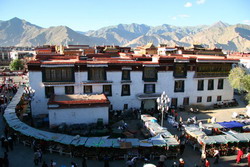 |
| [ Optional ] The Barkhor Street: The Barkhor Street is Lhasa's inner pilgrim circuit shaped roughly like an octagon that runs around the Jokhang. The circuit is lined with markets, shops, stalls and street vendors providing every conceivable item a Tibetan could need. The best place to start the circuit is right outside the Jokhang in a clockwise direction.
|
|
| Day 2 Lhasa ( B,L ) |
|
| The Barkhor Street | The Barkhor Street is Lhasa's inner pilgrim circuit shaped roughly like an octagon that runs around the Jokhang. The circuit is lined with markets, shops, stalls and street vendors providing every conceivable item a Tibetan could need. The best place to start the circuit is right outside the Jokhan…… | | The Jokhang Temple | The Jokhang Temple is the spiritual centre of Tibet - a destination for millions of Tibetan pilgrims. The oldest part of the temple dates back to the 7th century AD - being one of the two temples built by King Songsten Gampo to house the statues of the Buddha that his two foreign wives brought to Ti…… | | The Potala Palace | The Potala Palace is a landmark of Lhasa and Lama Buddism. It is a 13 storey and 1000 rooms' palace and once winter residence of the Dalai Lama. The construction of the present structure began during the reign of the fifth Dalai Lama in 1645 and took more than 50 years to complete. |
|
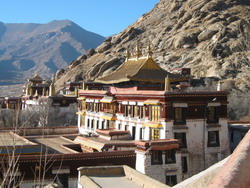 |
| [ Optional ] The Sera Monastery: The Sera Monastery lies on the northern edge of Lhasa at the base of Tatipu Hill. 'Sera' means 'merciful hail' denoting its rivalry with the 'Rice Heap' (Drepong) since hail destroys rice. Sera was smaller than Drepong with about 7,000 monks but was very rich and comparable in power. |
|
| Day 3 Lhasa ( B,L ) |
|
| Norbulingka | The Norbulingka Park: Norbulingka means "Jeweled Garden". It was constructed as a summer palace for the Dalai Lama at the very beginning and later served as the whole governmental administration. | | The Drepong Monastery | The Drepong Monastery: a cluster of white buildings resembling a riceheap, against the backdrop of Mount Gyenbuwndze. Founded in 1416, Drepong is the biggest and richest monastery in Tibet that was divided into four Tantric colleges - that specialised in different branches of knowledge. | | The Sera Monastery | The Sera Monastery lies on the northern edge of Lhasa at the base of Tatipu Hill. 'Sera' means 'merciful hail' denoting its rivalry with the 'Rice Heap' (Drepong) since hail destroys rice. Sera was smaller than Drepong with about 7,000 monks but was very rich and comparable in power. |
|
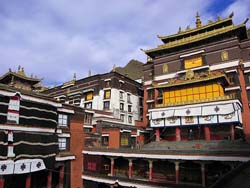 |
| [ Optional ] Tashilhunpo Monastery: Tashilhunpo Monastery, the home of the Panchen Lama, is located on the hillside overlooking Shigatse northwest of the town. Tashilhunpo Monastery for the most part escaped the ravages of the Cultural Revolution and its chapels contain countless statues and mural decorated halls. It was established in 1447 by Genden Trup. |
|
| Day 4 Lhasa ( B,L ) |
| After breakfast, transferred to visit Namtso Lake, one of Tibetan Buddhism's three holiest lakes. After the tour, transferred back to Lhasa. |
| Namtso Lake | Tibetan for 'Heavenly Lake', Namtso is regarded as one of Tibetan Buddhism's three holiest lakes. The lake is a pilgrimage site for Buddhists, who consider it the seat of Paramasukha Chakrasamvara. Buddhists believe that buddhas, bodhisattvas and vajras will assemble at Namtso in the Tibetan year of…… |
|
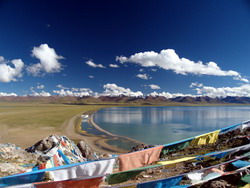 |
| [ Optional ] Namtso Lake: Tibetan for 'Heavenly Lake', Namtso is regarded as one of Tibetan Buddhism's three holiest lakes. The lake is a pilgrimage site for Buddhists, who consider it the seat of Paramasukha Chakrasamvara. Buddhists believe that buddhas, bodhisattvas and vajras will assemble at Namtso in the Tibetan year of the sheep. |
|
| Day 5 Lhasa, Gyantse, Shigatse ( B,L ) |
| Today we will drive to Gantse (about 256km, 5.5-hour), along the way you will visit Yamdrok Lake. After visiting the Pelkor Chode Monastery & the Kumbum Stupa in Gyantse, transferred to Shigatse where we will spend the night. |
| Yamdroktso Lake | Yamdroktso Lake (4408 m), where you will enjoy the vista of its pincer-shaped expanse of turquoise water, with the mysterious Mt. Donang Sangwari (5,340m) on the peninsula beyond, and the snow peaks of Nojin Gangzang (7,191m) in the distance. You can walk around the lake before continuing our drive …… | | Karola Glacier | Go all the way up to climb up the top of the Gangba-La pass, stop at Yamdroktso Lake, suddenly you will meet Karola Glacier face to face. The Karola Glacier is quite close to the road, a breathtaking view of the Karola Glacier is an unforgetable experience. | | Pelkor Chode Monastery & the Kumbum Stupa | Palkhor Monastery was founded in 1418. It houses both Pelkor Chode Monastery and the Kumbum Stupa, the world famous 9-storey 100,000-Buddha Pagoda with 9 floors, 108 doors and 77 rooms. Each room contains a different statue of Buddha and the wall frescoes tells the story. |
|
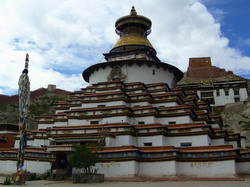 |
| [ Optional ] Pelkor Chode Monastery & the Kumbum Stupa: Palkhor Monastery was founded in 1418. It houses both Pelkor Chode Monastery and the Kumbum Stupa, the world famous 9-storey 100,000-Buddha Pagoda with 9 floors, 108 doors and 77 rooms. Each room contains a different statue of Buddha and the wall frescoes tells the story. |
|